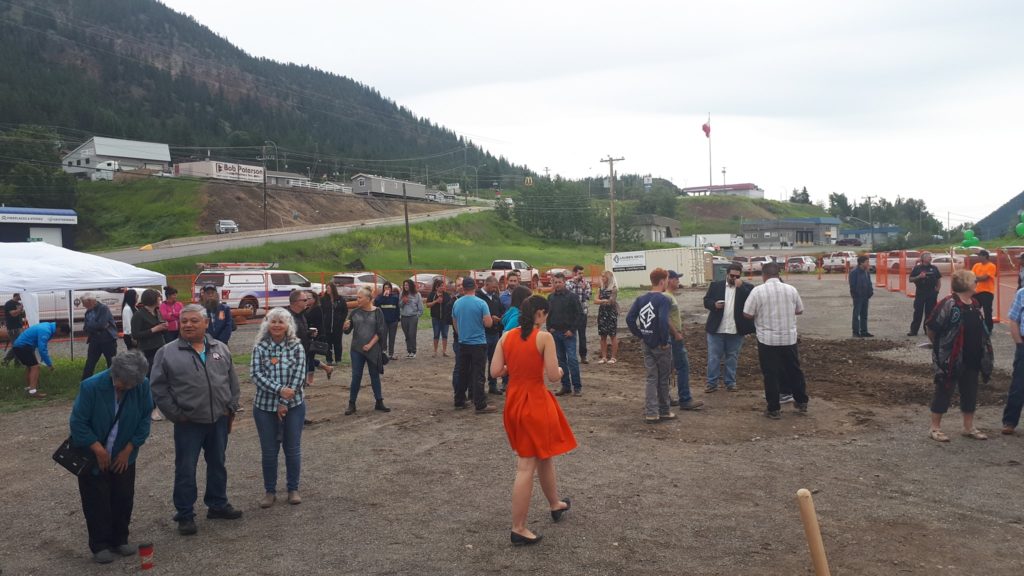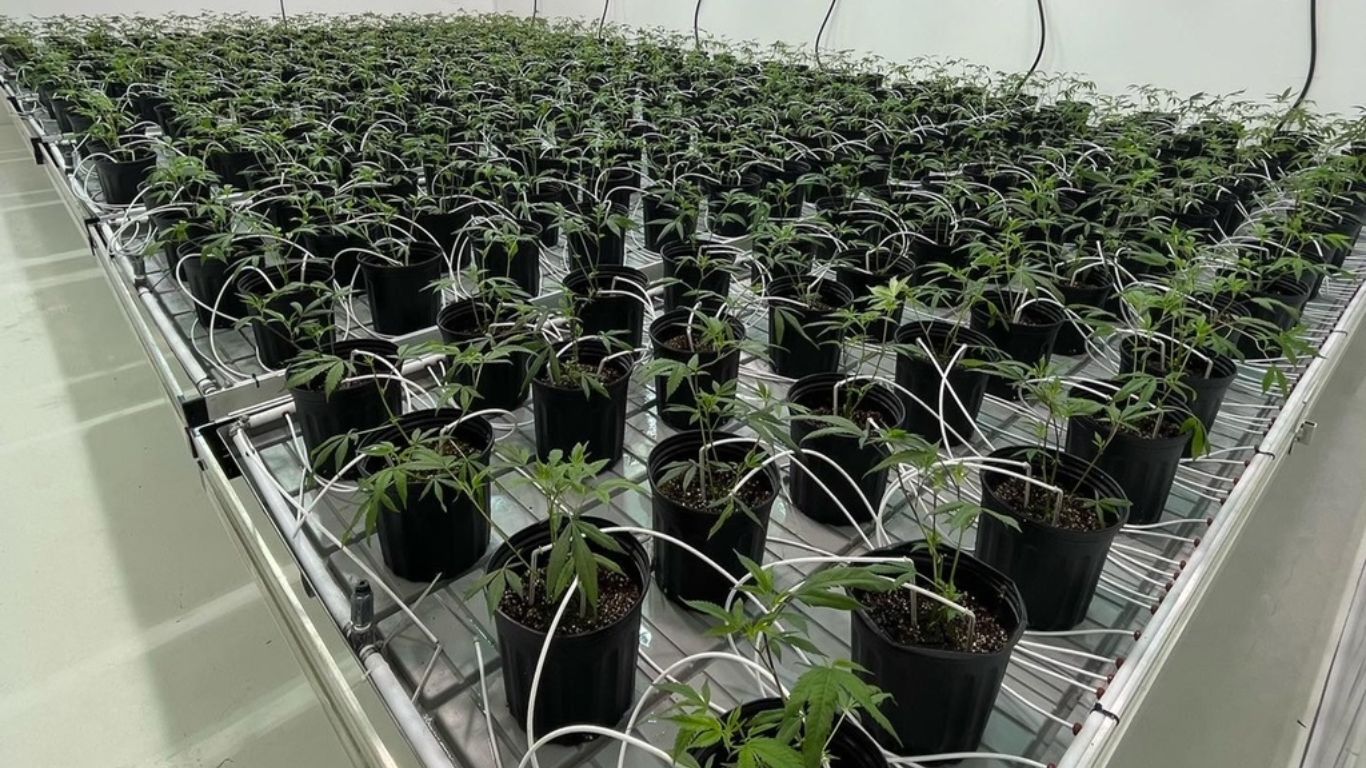
The BC Government announced a $500,000 grant for the Williams Lake Indian Band’s micro cannabis facility last week as part of nearly $14 million to support development and recreational opportunities accross rural BC.
The grant will help the First Nation with the cost of building their new 6,000ft2 micro cannabis facility in Williams Lake, along with another $250,000 from the Northern Development Initiative Trust and several hundred thousand from Indigenous Services Canada.
The Band estimates the total cost of the new facility, which will house not only a 2,100ft2 (200m2) micro cultivation and production facility, but a retail outlet for “farm to gate” sales of the facility’s products, will be around $2-2.5 million. A groundbreaking ceremony was shared on the Band’s Facebook page today.
Although the BC government has not yet approved cannabis producers to sell via a “farm to gate” model, the provincial government has repeatedly signalled their theoretical support for it in the past, noting it would be similar to how some wineries currently operate retail stores on their property. The Williams Lake Indian Band estimates it will take about two years to complete the facility.

The announcement from the province for the funding came as part of over 150 projects to support economic development and recreational opportunities for rural communities across British Columbia.
“We’re extremely grateful for the generous support of the Province of British Columbia,” said Williams Lake Indian Band Chief Willie Sellars. “The last five years have been very challenging for the Cariboo – with the Mount Polley disaster, the wildfires of 2017 and now the COVID-19 crisis. The WLIB cannabis cultivation project will help to kick-start our economy, create new jobs and stimulate tourism. This project represents a huge opportunity for the Williams Lake Indian Band and the Cariboo-Chilcotin.”
“We were able to secure a half million dollars from the province of British Columbia to support this cannabis cultivation facility,” the Chief told StratCann in an interview in May. “The provincial government has openly stated that they are looking at ways that funding bodies can be made available to First Nations communities that support their cultivation initiative.
“They liked the package we put together, and they want to support rural communities and the local economies amidst this Covid pandemic. We were also able to get another $250,000 from the Northern Development Initiative Trust, and this is the first cannabis cultivation that they are supporting, as well.”
“We’re extremely grateful for the generous support of the Province of British Columbia. This project represents a huge opportunity for the Williams Lake Indian Band and the Cariboo-Chilcotin.”
Williams Lake Indian Band Chief Willie Sellars
The town of Williams Lake launched an online survey this week to gauge feedback from residents on the new facility after city council expressed concern for the location of the proposed cannabis facility.. The Williams Lake Indian Band says the city has no jurisdiction on the issue.
“What is clear is that there is a fundamental misunderstanding of the jurisdiction and authority of the First Nations government, and more disturbingly, there appears also to be a lack of appreciation for the principles of reconciliation,” Chief Willie Sellars told BC local news last month.
Kirk Dressler, an Economic Development Contractor with the WLIB Economic Development team says that in addition to breaking ground on the new facility, Sugar Cane will soon apply for a federal micro cultivation and processing licence from Health Canada, utilizing the federal cannabis regulator’s Indigenous Navigator Service.
I think there are a lot of eyes on this. Obviously the province is heavily invested, the federal government wants to make sure that it’s a success, and so we’re optimistic that we won’t run into any significant problems with the licensing process.
Kirk Dressler, WLIB Economic Development
The Navigator system allows all self-identified Indigienous affiliated cannabis applicants who qualify to have direct access to a Health Canada reviewer through the entire process of licensing. The system was put in place as a way to provide further opportunities for Indigenous communities in Canada to take part in the federal cannabis licensing program, and to help them not rely on expensive outside consultants when navigating the licensing process.
Those applicants utilizing the Navigator service are able to begin the application process prior to a full facility build out.
“Health Canada has expressed a great deal of enthusiasm about this project,” said Dressler. “Before we headed into this pandemic, they were actually going to send their Aboriginal group to engage with us to kick off the licensing process. They have been emphatic that we don’t need a consultant and that they want to see this go as quickly as possible and make it a success. I think there are a lot of eyes on this. Obviously the province is heavily invested, the federal government wants to make sure that it’s a success, and so we’re optimistic that we won’t run into any significant problems with the licensing process.”
Dressler says the goal with the property will be to have the new Sugar Cane building house their micro cultivation and processing licenses, as well as their farm gate retail store specifically for Sugar Cane products. They plan to then transitioning the neighbouring Indigenous Bloom retail store to a fully licensed private cannabis retailer through the provinces licensing program. The new retail outlet would be rebranded as Unity Cannabis.
Ultimately, he says he hopes it could be a tourist draw for the area that other communities, including other First Nations, can also benefit from.
“I think it will be a model that everyone will be watching, particularly First Nations. It’s super cool that we are creating a template that other First Nations can potentially follow and pave the way for more of these (businesses) and more of an experience around cannabis.
“And maybe it will allow people who are currently dwelling in the grey market, for a variety of reasons – because they don’t how to go into the white market and they are concerned that you can’t do white market cannabis in a quality setting and in a way that allows them to have their creativity – and what we’re doing is exactly that.”











